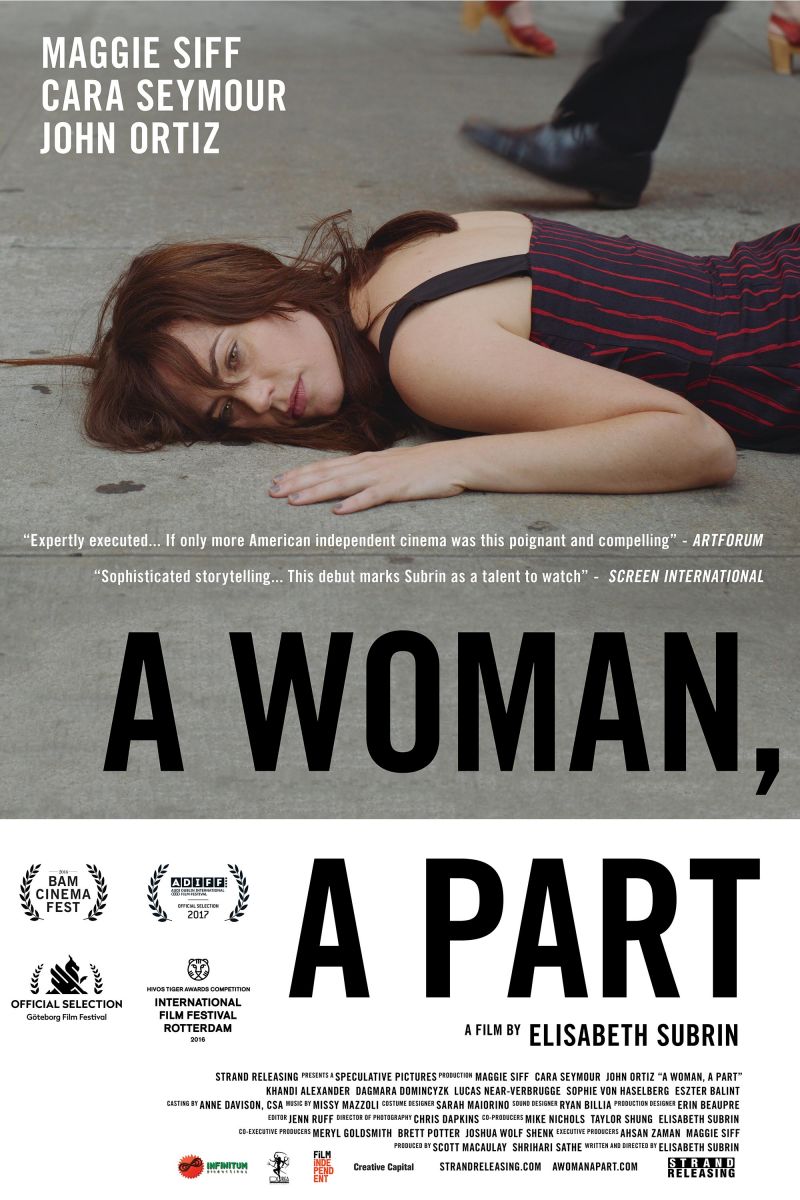
A Woman, a Part
2016
Feature-length narrative film, 98 minutes
Written & Directed by Elisabeth Subrin
Starring Maggie Siff, Cara Seymour, John Ortiz, Khandi Alexander
Produced by Scott Macaulay & Shrihare Sathe
Cinematography by Chris Dapkins
Editing by Jenn Ruff
Music by Missy Mazzoli, Micachu and the Shapes
OFFICIAL TRAILER
Subrin's first feature narrative film, A Woman, A Part examines a transformational moment in the life of Anna Baskin, a successful LA actress in emotional, physical and professional crisis. Anna is known by millions of viewers for the crisply professional, brittle journalist she plays on a weekly television series. But she finds herself imprisoned by this role, and unable to locate the passion that caused her to embrace acting in the first place. Her journey back to New York is a journey into her past, colliding her with colleagues, friends and past loves whose lives she unwillingly changed when she made the choices that she now questions so deeply. The intimate story of Anna and her friends is magnified by the film’s surrounding political and social themes and issues: friendship, gentrification, addiction, autoimmune disease, careerism, sexism in the film industry and the hazy lines between authenticity and acting.
"Subrin’s A Woman, A Part testified to the expansive complexity that can be generated out of a restricted set of parameters when expertly executed. Subrin follows Anna Baskin (Maggie Siff), an exhausted actress on the brink who leaves Los Angeles to return to New York, reuniting with her old friends and artistic collaborators Isaac and Kate. If this sounds like Cassavetes redux, think again: With none of the penchant for hysterics characteristic of the misogynist/genius (to echo Le Tigre), Subrin communicates love for the strength and resilience of her characters despite—or because of—their deep flaws, following them as they navigate changing lives, changing technologies, and a changing city. At the premiere, Subrin described her film as being about “the search for authenticity and how it eludes us in an era of branding”... A Woman, A Part’s refreshing departures from the norm are to be found less in the film’s form, which remains rather conventional, and more in its treatment of human subjects, particularly its willingness to push back against hackneyed character types and insist on the need to represent diverse people and experiences onscreen. If only more American independent cinema was this poignant and compelling." — Erika Balsom, ARTFORUM
"Siff colors her performance with such depth and texture that Anna's backstory seems as alive and full as what's captured during the interactions onscreen. She is experiencing an existential crisis of sorts; an inward evaluation and reflection of her life at a micro-level, which could be representative of larger macro issues concerning our identities in society today. "We are living in an era of constructed identity and artificial presentation of self because of social media and self-branding," says Subrin. "In a way, we're all performing," she explains, "and an actress is just a stand-in for how we all act." Bearing the title of the film in mind, A Woman, A Part is as much about the crisis of an actress as it is about the breakdown of human performance in modern society.
And about women specifically, Subrin cites a Susan Sontag quote to address gender performance: "to be a woman is to be an actress." To an extent, we're all projecting and performing our female and/or male roles, but "to another extent," says Subrin, "the burden of appearance in how one is presented to the world, and the sub-consciousness around that is something men don't deal with as much. The line between acting and being is a much more complicated issue for women."
How gender performativity influences all of us is certainly a complicated issue, in that it’s difficult to diagnose and maybe impossible to cure. But how the experience of a singular actress in Subrin's A Woman, A Part speaks to our social, political, and socio-economic consciousness on a global scale is unmistakable. Luckily, with the benefit of a film on a screen, we don't have to suffer an existential crisis ourselves in order to understand something more deeply about how we interact with our identities in relationships, jobs, and in our everyday lives." —Taylor Hess, "Caught In the Act," Rotterdam International Film Festival
Screenings:
World Premiere: 2016 Rotterdam International Film Festival, Tiger Awards Competition, January 30
North American Premiere: 2016 BAMcinemaFest, Brooklyn Academy of Music, New York, June 19
Website: www.awomanapart.com
Facebook: www.facebook.com/awomanapart/